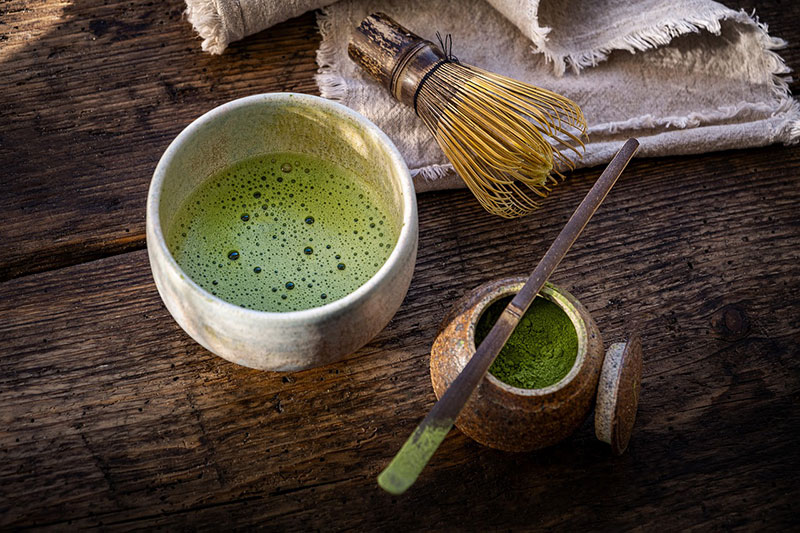Exploring flavor nuances of exquisite tea leaves may bring an extreme joy to some people. But not to everyone. What if flavor is not the only thing you are looking for in your cup of tea? What if you want it all – a tea with high caffeine content, yummy flavor, rich in nutrients and easy to brew? Or what if you only want a tea high in caffeine? Matcha may be the ONE. Not only it’s unique and delicious, but it may be a healthier alternative to coffee for getting a much needed caffeine boost. But is matcha stronger than coffee? Yes, and no.
What is matcha?
Matcha is a type of Japanese green tea. Unlike other teas, matcha is powdered and prepared by dissolving, not steeping, powder in hot water. Over the last decade, matcha received a world-wide recognition for its flavor, high caffeine content and health benefits. But wait, if matcha is a green tea, shouldn’t all green teas provide the same benefits? Well, no. Matcha is more than just a powdered green tea.
First, it’s made from special tea cultivars. Some may be used for making other green teas, but they have all been chosen because of their high quality and specific characteristics such as color or flavor. Next, matcha is made from shaded tea leaves. There is more, of course.
Matcha is made from younger buds and leaves, that are de-veined and de-stalked and cut into small flakes. Those small flakes are called tencha. The real matcha is always made from ground tencha tea leaves. Some green tea powders from other countries may have a great flavor but may not have the same chemical composition. In fact, they shouldn’t even be called matcha. Why? Because they were made not only from different cultivars and come from different terroirs. There were made using different growing, harvesting and producing techniques, which may all have an impact the final caffeine content.
Read why is matcha so expensive here.
Coffee caffeine content
Coffee, just like tea, can be made from different varieties and cultivars. They will also have different caffeine content and different flavors. Next, the way you make your coffee will determine its strength too.
A cup of coffee can have anywhere between 20-30 to over 1500 mg of caffeine per cup. Yes, 1555 mg[1] of caffeine per 12 oz cup is the amount found in the world’s strongest coffee. Correctly labelled as “dangerous”, such high levels of caffeine are far from what you could expect in a regular cup of coffee.
Studies suggest that a safe dose of caffeine is 400 mg a day[2]. Anything more may lead to serious problems, especially if ingested at once. Regular types of coffee will always have much less caffeine than the world’s deadliest coffee.
For example, expect around 60-70mg (more or less) of caffeine per one espresso shot, usually more than 140mg, but less than 250 mg per 12 oz of brewed specialty coffee,[3] and around 70-100 per 12 oz cup of latte[4]. However, the exact amount of caffeine may significantly vary from type to type. Some types of coffee beans are naturally lower in caffeine.
Matcha caffeine content
And the same is true for tea. Some types of tea are naturally lower or naturally higher in caffeine. Some of the factors that can make matcha higher in caffeine than other teas are the shading process and the way you prepare it. Shading will increase the caffeine content and amino-acid content in tea leaves. Next, younger tea leaves and buds used for making matcha are higher in caffeine. Stalks and veins are removed from the tea leaves, which leaves only the pure leaf, highest in both nutrients and caffeine.
When brewing a cup of regular loose leaf tea, water temperature, the amount of leaves and steeping time will play a key role too. Caffeine is best released in boiling water, when steeped longer than recommended for getting the best flavor. For example, one study showed that more caffeine will be released at 90 than 30 degrees Celsius when steeped for about 15 minutes. Tea that was steeped longer had even more caffeine, but the increase was not as significant as in the first 15 minutes[5]. Matcha doesn’t need to be steeped, so you will ingest the whole leaf and all the caffeine it contains.
So, how much caffeine is there in matcha? One regular serving of matcha tea is likely to contain about 60 mg of caffeine. 1 gram of matcha powder has around 30 mg of caffeine. You will usually need 2 grams of 2 chashaku of powder to make a bowl of matcha tea. Intuitively, if you use more powder, you will get more caffeine. Therefore, a bowl of matcha may, indeed, be stronger than a shot of espresso. But the same is true for a homemade coffee. The more beans/instant powder you use, the stronger your coffee will get.
But there’s one more catch. Let’s say we have a cup of coffee and a cup of matcha with the same amount of caffeine. Remember the higher amino-acid content in shaded tea mentioned before? The most important amino acid in tea is L-theanine. L-theanine is responsible for the calming effect. That’s why a bowl of matcha will provide not only caffeine, but L-theanine too. You won’t feel a sudden energy spike, but rather a refreshed, energised feeling throughout several hours.
That’s why even if the espresso and matcha caffeine content are the same, the effect may be very different. The first one may cause the jitters and will give you an instant energy boost. The second one will provide more sustained energy and less drowsy once the caffeine effect fades.
So, it matcha stronger than coffee? Yes, and no.
Disclaimer: This article does not replace a professional medical advice.
Sources:
[1] https://www.caffeineinformer.com/caffeine-content/black-label
[2] https://www.ncbi.nlm.nih.gov/pmc/articles/PMC5445139/
[3] https://www.researchgate.net/publication/9018119_Caffeine_Content_of_Specialty_Coffees
[4] https://www.sciencedirect.com/science/article/pii/S2214750018303275
[5] https://www.researchgate.net/publication/259552781_Effect_of_Infusion_Time_and_Temperature_on_Decaffeination_of_Tea_Using_Liquid-Liquid_Extraction_Technique



 Image by
Image by
Leave a Reply Cancel Reply